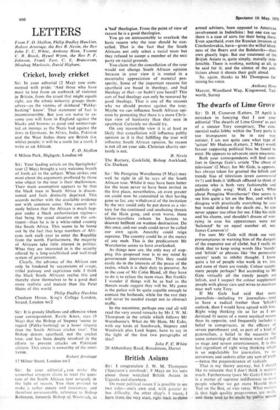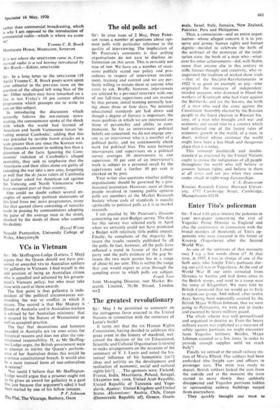The dwarfs of Lime Grove
Sir: D. H. Cameron (Letters, 25 April) is mistaken in fancying that I saw your editorial 'The dwarfs of Lime Grove' as part of a sinister Tory conspiracy. The com- mercial radio lobby within the Tory party is too transparent to be in any way sinister. I am not quite sure what type of 'action' Mr Hudson (Letters, 2 May) would favour supposing political bias be found to exist. He appears to advocate stern measures.
Both your correspondents will find com- fort in George Gale's article 'The abuse of television' (2 May), for Mr Gale, is appears, has always taken for granted the leftish and trendy bias of television (even commercial TV?) and finds it 'difficult offhand to think of anyone who is both very fashionable and publicly right wing'. Well, I don't. What about Peregrine Worsthorne? One seems to see him quite a lot on the Box, and while I disagree with practically everything he says but would defend to the death etc., he can never appear too often for me. I like his style and his charm, and shouldn't dream of wor- rying in case his appearances were not 'balanced' by an equal number of, say, James Cameron's!
I'm sure Mr Gale will think me very presumptuous in warning him of the dangers of the excessive use of cliche, but I really do think that to keep using words like 'trendy' and 'leftish' or phrases like 'the permissive society' tends to inhibit thought. I know quite a lot of people who work in Tv, too, and none of them are trendy. Colour supple- ment people perhaps? But according to Mr Gale virtually all the trendy people are leftish, and I suspect the colour supplement people with glossy cars and wives to maintain may well vote Tory.
If Mr Gale had said that most journalists—including TV journalists—tend to have a radical (rather than 'leftish') outlook, then I would have agreed with him. Right wing thinking (in so far as I un- derstand it) seems of a more mystical nature than its opposite, and frequently includes a belief in conspiracies, in the efficacy of severe punishment and, as part of a kind of paternalism, a belief in the necessity for some censorship of the written word as well as stage and screen entertainment. It is this last ingredient of right wing thinking which is so unpalatable for journalists, TV in- terviewers and seekers after any sort of truth —hence the preponderance of radicals. That is my theory anyway, but I should like to reiterate that I don't think it matters much. Furthermore (pace Mr Gale) I think it is a matter of supreme indifference to most people whether we get more Harold than Ted on the Box, or vice versa. What matters is that high quality programmes are made, and these tend 4o be made hy public service
rather than commercial broadcasting, which is why I am opposed to the introduction of commercial radio—which is where we came in!
Yvonne C. R. Brock Montacute House, Montacute, Somerset
it is not where the SPECTATOR came in. Com- mercial radio is a red herring introduced by Mrs Brock.—Editor, SPECTATOR Sir: In a long letter to the SPECTATOR (18 April) Yvonne C. R. Brock pours scorn upon your editorial in the previous issue on the question of the alleged left wing bias of the BBC. Other readers may have remarked on a line in last Friday's 10 pm current affairs programme which prompts me to write to you on this subject. In introducing the discussion which normally follows the ten-minute news- reading, the commentator spoke of the shock with which the world had learned of American and South Vietnamese forces 'in- vading neutral Cambodia', adding that this was preceded by terrible bomb attacks on a wale greater than any since the Korean war. These remarks amount to nothing less than a distortion of the facts. Ignoring the Com- munists' violation of Cambodia's alleged neutrality, they seek to emphasise that the Americans and their allies alone are guilty of extending the war into a new area, forgetting as well that the de facto rulers of Cambodia had earlier asked for American aid against the Vietcong and North Vietnamese who have occupied part of their country.
One could no doubt collect several ex- amples of seemingly partisan statements of this kind from BBC news programmes, many like that quoted above consisting of remarks made in passing by commentators adopting the guise of the average man in the street, shocked by the deeds of those who control his destiny.
Hywel Wynn Neuadd Pantycelyn,- University College of Wales, Aberystwyth



































 Previous page
Previous page